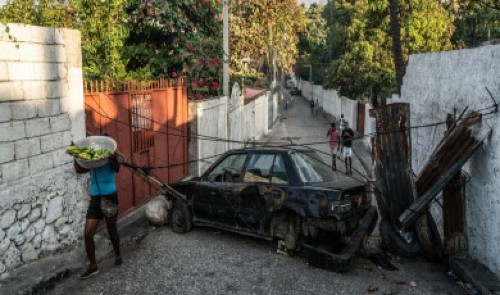GENEVA - Haiti’s Permanent Representative to the United Nations in Geneva, Justin Viard, Tuesday welcomed the report of the United Nations High Commissioner for Human Rights, Volker Turk, who had earlier warned that the scale of human rights abuses is unprecedented in modern Haitian history.
 Barricades are regularly erected to block roads in Port-au-Prince. (Photo courtesy UNOCHA/Giles Clarke)“The escalation of violence has had a devastating impact on the population. All human rights are impacted, Turk said in a video message to the UN Human Rights Council.
Barricades are regularly erected to block roads in Port-au-Prince. (Photo courtesy UNOCHA/Giles Clarke)“The escalation of violence has had a devastating impact on the population. All human rights are impacted, Turk said in a video message to the UN Human Rights Council.
“This session on Haiti is taking place at a critical moment for the country. A situation that was already alarming has deteriorated rapidly in recent weeks. This is clearly documented in the report presented by my Office today,” he said.
Viard told the UN Human Rights Council that the report underscored the deep challenges that Haitians are facing.
Viard said that the international community and Haiti must act together to address both the gangs and the root causes of the crisis, which include widespread unemployment, a failing educational system and food insecurity.
“We must move from words to concrete actions. We cannot allow for Haiti to one day show up in a page of history as an example of the powerlessness of the international community or the abandonment of the population of a UN Member State.”
The UN Deputy High Commissioner for Human Rights, Nada Al-Nashif, who answered questions from country and civil society representatives, spoke of engagement around the UN-backed multinational support mission that will assist the Haitian National Police to ensure that it complies with relevant international human rights standards.
“All this means that the capacities of the human rights service will require more strengthening in certain areas, particularly, for example, violence against children,” she said.
The High Commissioner’s designated expert on the human rights situation in Haiti, William O’Neill, told the Human Rights Council meeting that nsecurity was the chief concern raised and “everything else flows from that.”
He said the airport in Port-au-Prince has been closed for more than four weeks, while gangs control access to all major roads in and out of the city, meaning that “there is no escape (by) air, land or sea”.
O’Neill reported that Haiti’s largest hospital has basically been emptied out, “and today we heard that a gang has overtaken and taken over the whole premises, what’s left of it.”
Highlighting the deployment of the UN-backed multinational mission, he emphasized its supporting role, stating that it is “not an occupation”.
He said although the mission will boost Haiti’s police, the national force will also need intelligence support, assets such as drones, and the means to intercept gang communications and halt illicit financial flows to them.
“They need some vetting, There’s some Haitian National Police, unfortunately, that are still in connivance with the gangs and that’s got to be addressed.”
The justice system, currently “on its knees”, will also need assistance with investigating and prosecuting gang leaders when it is back to functioning, O’Neill said urging countries to work to stop the flow of arms and ammunition to Haiti’s gangs.
He noted that some representatives also pointed to the need for sanctions against the people who sponsor the gangs.
“If we take those three measures, the support service for the police, sanctions, arms embargo, we begin to maybe turn around the momentum in a positive direction and stop it from this slide that we’ve seen intensify over the last few weeks,” he said.
The rights expert also called for greater support for the US$674 million humanitarian appeal for Haiti which is currently around seven per cent funded.


